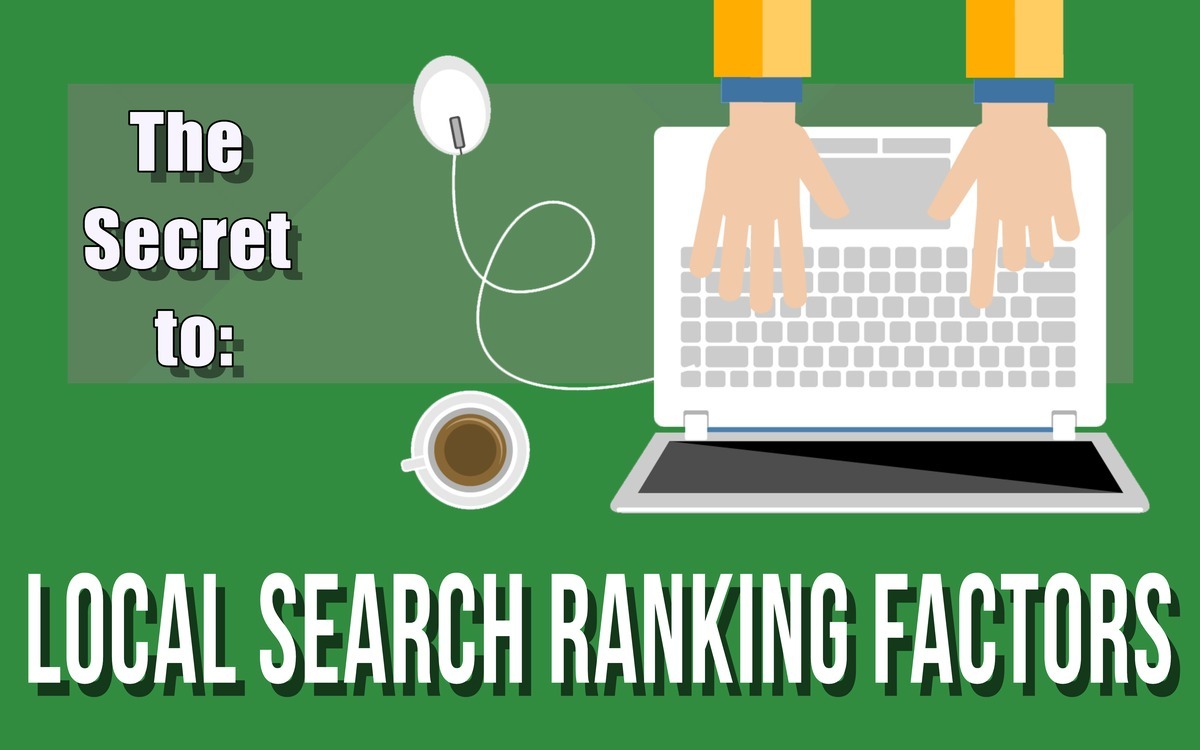
This is a custom HTML / JavaScript Element
In order To See Your Custom HTML/JavaScript Code in Action You Must Click On The Preview Page Button, Your Code is NOT going to be active in the edit mode
Decode Your Way Up! Secrets to Soar in Local Search Rankings!
Local search ranking factors refer to the various elements that search engines like Google take into account when ranking local businesses in search results. These factors are important because they determine how visible a business is to potential customers who are searching for products or services in their local area. In this answer, we'll provide a detailed overview of the most important local search ranking factors.
Google Business Profile (GBP) Signals
Google Business Profile is a free tool offered by Google that allows businesses to manage their online presence across Google, including search and maps. The accuracy and completeness of GMB listings are important ranking factors. This includes factors such as the name, address, and phone number (NAP), categories, website, reviews, and photos.

On-Page Signals
These are the elements on a business's website that help search engines understand what the website is about. On-page signals include factors such as the page title, meta description, header tags, content, and local schema markup.
On-page signals refer to the elements on a business's website that help search engines understand what the website is about. These elements can include the page title, meta description, header tags, content, and local schema markup.
Page Title
When you visit a web page, the main heading that appears at the top is referred to as the page title. It is important to include the target keyword in the page title, as well as the business name and location if relevant. The page title should also be concise and accurately describe the content of the page.
Meta Description
The meta description is a short summary of the content on a web page that appears in the search engine results page (SERP) under the page title. It is important to include the target keyword and a call-to-action (CTA) in the meta description, as well as accurate and compelling information that encourages users to click through to the website.
Header Tags
Header tags (H1, H2, H3, etc.) are used to structure the content on a web page. The H1 tag should include the target keyword and accurately describe the content of the page. H2 and H3 tags can be used to further organize the content on the page and improve its readability.

Content
The content on a web page should be high-quality, relevant, and informative. It is important to include the target keyword in the content, as well as other related keywords and phrases. The content should also be organized into sections with clear headings and subheadings, and include images and videos where appropriate.
Local Schema Markup
Local schema markup is a valuable code that can be incorporated into a website to assist search engines in comprehending important information such as the business's location, hours of operation, and phone number. This can be extremely beneficial for the business. This can help improve the visibility of the business in local search results.
Link Signals
Link signals refer to the quality and quantity of links pointing to a business's website from other websites. Links from high-quality, relevant websites can help improve a business's local search rankings.

Here are some of the most important link signals to consider for local SEO:
Quality of Links: When it comes to links, those coming from authoritative websites hold greater value than those from low-quality sources. As a helpful tip, it's always wise to prioritize building links from reputable and trustworthy websites. In other words, if you want to improve your website's search engine ranking, it's crucial to concentrate on creating links from websites that are pertinent to your industry, possess a strong domain authority, and are trusted by search engines. As someone who has worked with copywriters, I suggest that you prioritize building high-quality links to boost your website's online visibility and attract more potential customers.
Quantity of Links: The number of links pointing to a website is also an important factor in local search rankings. However, it's important to note that quality is more important than quantity. It's better to have a few high-quality links than many low-quality links.
Anchor Text: The anchor text is the text that is used to link to a website. It's important to include the target keyword in the anchor text, as this helps search engines understand the relevance of the link to the content on the website.
Diversity of Links: A diverse range of links from different types of websites can help improve a business's local search rankings. This can include links from directories, social media profiles, industry-specific websites, and local news sites.
Relevance of Links: Links from websites that are relevant to your business and industry are more valuable than links from unrelated websites. It's important to focus on building links from websites that are relevant to your business, as this helps establish your website as an authority in your industry.
Link Velocity: The rate at which a website acquires new links can also impact local search rankings. A sudden increase in the number of links pointing to a website can indicate to search engines that the website is engaging in spammy link-building practices, which can negatively impact search rankings.

Citation Signals: A citation is any mention of a business's name, address, and phone number (NAP) on other websites. The consistency and accuracy of these citations across the web are important ranking factors.
Here are some of the most important citation signals to consider for local SEO:
Consistency of Citations: If you want to boost your business's online presence, it's important to ensure that your NAP information (Name, Address, Phone number) is consistent across all online platforms. Inconsistent information can cause confusion for search engines and ultimately result in lower local search rankings. Keeping your NAP information up-to-date and accurate can help improve your online visibility and make it easier for potential customers to find you.
Accuracy of Citations: It's important to ensure that the business's NAP information is accurate across all citations. Incorrect information can confuse search engines and potential customers, and negatively impact local search rankings.
Number of Citations: The number of citations a business has can also impact local search rankings. A business with a large number of high-quality citations is more likely to rank highly in local search results.
Quality of Citations: The quality of citations is also an important factor in local search rankings. Citations from high-quality, authoritative websites are more valuable than citations from low-quality websites.
Diversity of Citations: A diverse range of citations from different types of websites can help improve a business's local search rankings. This can include citations from directories, review sites, industry-specific websites, and local news sites.
Geographical Relevance of Citations: Citations from websites that are geographically relevant to the business can also help improve local search rankings. For example, a citation from a local chamber of commerce or a city-specific business directory can indicate to search engines that the business is relevant to that particular location.

Review Signals: Online reviews from customers are an important factor in local search rankings. The quantity, velocity, diversity, and sentiment of reviews are all taken into account.
Here are some of the most important review signals to consider for local SEO:
Quantity of Reviews: The number of reviews a business has can impact local search rankings. A business with a large number of reviews is more likely to rank highly in local search results.
Quality of Reviews: The quality of reviews is also an important factor in local search rankings. Positive reviews from satisfied customers can help improve a business's local search rankings, while negative reviews can have the opposite effect.
Diversity of Review Sites: Reviews from a variety of different review sites can help improve a business's local search rankings. This can include review sites like Google My Business, Yelp, TripAdvisor, and Facebook.
Freshness of Reviews: The freshness of reviews can also impact local search rankings. Businesses that regularly receive new reviews are more likely to rank highly in local search results than those with outdated or stagnant reviews.
Sentiment of Reviews: The sentiment of reviews can also impact local search rankings. Positive reviews can help improve a business's local search rankings, while negative reviews can have the opposite effect.
Owner Responses to Reviews: Owner responses to reviews can also impact local search rankings. Businesses that respond to both positive and negative reviews in a timely and professional manner can improve their online reputation and attract new customers.
Behavioral Signals
These signals refer to the actions taken by users when they visit a business's website, such as how long they spend on the site, the bounce rate, and the click-through rate. These signals indicate how engaged users are with the site and can impact search rankings.

Personalization
Personalization refers to the fact that search results can be tailored to the individual user based on their location, search history, and other factors. Local businesses that are relevant to the user's search query and location are more likely to appear in their search results.
Overall, local search ranking factors are complex and multifaceted. Businesses that invest in optimizing their online presence across all of these factors are more likely to rank highly in local search results and attract new customers.
Final Thoughts
In the world of SEO, local search ranking factors play a critical role in determining the visibility and success of a business. From optimizing your website to managing your online reviews, there are a number of factors that can impact your local search rankings.
One of the most important things to keep in mind when it comes to local search ranking factors is that they are constantly evolving. What may have been effective a year ago may not be as effective today, and new factors may emerge that you need to consider.
That said, there are some fundamental factors that are likely to remain important for the foreseeable future. For example, having accurate and consistent business information across all of your online listings is essential. This includes your business name, address, phone number, and website URL.
Another critical factor is having a strong online presence. This means having a well-designed website that is optimized for local search, as well as an active presence on social media and other relevant online platforms.
In addition to these foundational factors, there are a number of other things you can do to improve your local search rankings. For example, getting positive online reviews from satisfied customers can help boost your visibility and credibility, while creating high-quality content on your website and other online platforms can help establish you as an authority in your industry.
At the end of the day, the key to success with local search rankings is to stay up-to-date on the latest best practices and trends, and to be willing to adapt your approach as needed. By doing so, you can help ensure that your business is well-positioned to succeed in today's increasingly competitive digital landscape.
*We hope you found this helpful. Feel free to reach out about your business. There are zero obligations.

 Add Row
Add Row  Add
Add 



